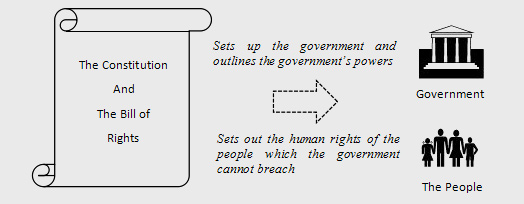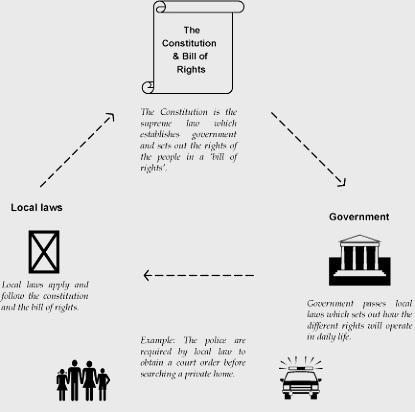
The Constitutional Commission is one of the independent governance bodies established by the Cayman Islands Constitution Order 2009. The Commission aims to support democracy by creating openness and transparency in modern governance.
The functions of the Commission are found in section 118(3) of the Constitution and are as follows -
No, the Constitutional Commission is an independent body which is deemed crucial for the effectiveness and legitimacy of the Commission.
No, this Commission is not mandated to report its activities to any person/body.
All members are appointed by the Governor, in consultation with the Premier and Leader of the Opposition.
This Commission must consist of a Chairperson and two other members, at least one of whom shall be an experienced lawyer. The list of current members can be found here Commission Members and previous members can be found here Past Commission Members.
The Chairperson is expected to chair each meeting and oversee the participation of all of the members in the activities of the Commission. Commission members are expected to attend each meeting and participate in the activities of the Commission.
Appointments to the Constitutional Commission will be for renewable terms of between two to four years, with members serving for different periods, so that new appointments or re-appointments can take place in a staggered fashion.
No, the Commission Members are volunteers who receive a small stipend for their hard work and dedication. Members receive $100 per meeting with a maximum stipend of $500 per month and Chairpersons receive $200 per meeting with a maximum stipend of $1000 per month.
If you have a concern regarding the behaviour of a member as it pertains to their role on the Constitutional Commission, those concerns be directed in writing to Her Excellency the Governor.
The Commission receives administrative, research, policy, strategic, and other support from the Commissions Secretariat. The Commissions Secretariat falls under the purview of both the Office of the Governor and the Portfolio of the Civil Service.
A Constitution is a document which establishes the government system, creates procedures and structure for the government and sets out the government’s powers. Therefore, it is also useful for a constitution to set out the rights of the people, which the government cannot breach.

Once a government system has been established, the government will pass laws and follow the procedures set out in the Constitution, as it is the supreme source of all the country’s laws (i.e. the local laws must comply with the Constitution).

The Constitution is a legal document and has a single legal interpretation. The term "living document" primarily refers to the fact that the constitution has an impact on everyday life whether we are aware of it or not. Through the interpretation of the Constitution it is said to grow, expand and adapt. In this way, it can evolve like a living thing.
The Constitutional Negotiations between the United Kingdom Government and the Cayman Islands Delegation comprised three round of meetings held from September 29, 2008 – February 5, 2009. The last round was held in London.
A number of persons participated in the negotiation meetings including representatives from the Cayman Islands Government including some Honourable Ministers and Members of Cabinet, as well as other elected Officials spanning all political parties, representatives of the United Kingdom Foreign Commonwealth Office, and non-Governmental organisations such as the Human Rights Committee (defunct since 2009) and the Cayman Minister’s Association.
No, the United Kingdom Government gave clear indication that the Cayman Islands Constitution required a Bill of Rights. This position was originally stated in the 1999 White Paper on Overseas Territories.
Yes, it is observed on the first Monday in July of each year, commemorating 4 July 1959 as the date when the first Constitution for the Cayman Islands was enacted.
The 2009 Constitution permits 25 percent of voters to present a signed petition to Cabinet, which would result in Cabinet settling the wording of the referendum question or questions and determining the date of the referendum. Once Cabinet has completed these tasks the Legislature is required to enact a referendum law so that the referendum can be held.
People-initiated referendums must be held on matters of national importance, but those matters cannot contravene any part of the Bill of Rights or any other part of the Constitution.
Yes. During the constitutional negotiations the Cayman Islands Delegation proposed that any future amendments should require the authorisation of a referendum, unless the change is declared to be minor or uncontroversial by the Premier and the Leader of the Opposition.
As stated in the letter of entrustment, the United Kingdom Government agreed with the idea that major amendments should receive the consent of the people of the Cayman Islands and pledged to use its best endeavours to honour this referendum requirement. However it was necessary for the United Kingdom to reserve its power to amend the Constitution in the event that any exceptional circumstances were to arise where it would not be possible or appropriate to hold a referendum.
The Constitutional Commission may be contacted through the Secretariat in the following ways:
Phone: +1 (345) 244-3685
Fax: +1 (345) 945-8649
Website: www.constitutionalcommission.ky
E-mail: info@constitutionalcommission.ky
Mailing Address: P.O. Box 391 KY1-1106
Physical Address: 4th Floor George Town Financial Center, 90 Fort Street
FOI requests: foi.cos@gov.ky